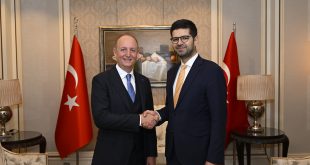NTV Piyasa Ekranı Program: 3rd Annual Executive Briefing on Private Equity in Turkey and Environs had been organized in Istanbul recently. More than 200 PE fund representatives managing US$ 1 trillion of assets worldwide gathered in this event. We’ll be talking to Mr. Barış Öney, Founder of Globalturk Capital, whether we’ll be seeing any capital entry into the market or not. Mr. Öney, thank you for coming.
Actually we hear a lot of speculations such as some capital will be coming to Turkey through Arab investors and the like. But when we look at the real numbers, it is disappointing. But here, we read a very attractive headline saying that, “PE fund representatives managing US$ 1 trillion of assets worldwide came to Turkey.” We know they came to participate the event but what are your expectations for the end results?
Barış Öney: Thank you very much. Let me explain it very briefly. We organize this event together with EMPEA which is the association of the private equity funds that invest in emerging markets. This year’s event was the 3rd one in a row. Members of EMPEA do manage around US$ 1 trillion of assets in more than 100 countries. The interest to this year’s event was really high as more than 200 investors participated. Among these participants, the representatives of the PE funds that invested more than US$ 30 billion in Turkey to date were already present. We had a very effective meeting. We asked this very question you’ve already mentioned to the investors during the event. We asked if they think about investing in Turkey in 2018. Almost 80% said “yes”. This was very pleasing.
NTV PE: What is attractive in Turkey for them? We know that President Erdoğan couldn’t attend the meeting but sent a very warm message to the investors. What do the foreign investors talk about Turkey? Do they mention its problems as much as it’s mentioned in the Turkish press? Which issues are of their concern the most?
Barış Öney: First of all we should separate private equity funds from the other ones as these funds are being raised for 10 years and the funds make their investments in 10 year cycles. They are not much effected by daily changes in the economy. Actually, since 2012 emerging markets have been in the fall for these funds. The funds raised have been invested mostly to the US and Europe recently. But it seems like the interest in emerging markets like China, India –including Turkey- is up again beginning from 2018. 2017 had been an important year in terms of investments and exits too. Especially, 3 exits had been realized through IPOs. Normally these funds, after 5 to 8 years, sell their shares and exit from the companies that they invest in. But this year, for the first time, they were also able to exit through IPOs. This was very important. They also keep on investing. Recently last year, a new source over US$ 1 billion was raised for Turkey. They also keep on investing. Therefore, because of these funds, there is a good amount of activity in the market.
NTV PE: So is this also a solution for liquidity… My final question is, are these funds only enter the country through the capital markets? If not, which areas look more attractive for foreign investors in Turkey?
Barış Öney: These funds generally come into our companies as a form of FDI. When they do, they take active positions in management boards as they aim to help companies grow rapidly. This is important both for the companies’ and investors’ returns. These funds normally approach to companies who are not publicly listed in stock exchanges. At least, up until now, they operated like this in Turkey. But of course they are aware of the importance of the stock markets for exits. And if they are capable of realizing the exits through IPOs, they are able to gain more by presenting the shares to the public and during listings more liquidity is brought to the stock market. So during the entry and exit processes, these funds provide great contributions both for the countries and companies.
NTV PE: Thank you very much Mr. Öney.
 Barış Öney
Barış Öney





